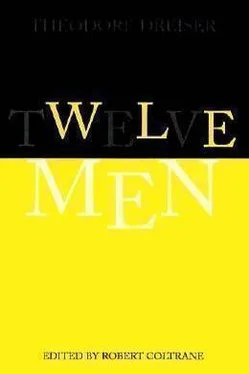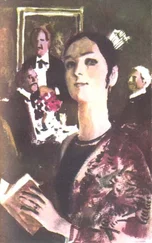Теодор Драйзер - Twelve Men
Здесь есть возможность читать онлайн «Теодор Драйзер - Twelve Men» весь текст электронной книги совершенно бесплатно (целиком полную версию без сокращений). В некоторых случаях можно слушать аудио, скачать через торрент в формате fb2 и присутствует краткое содержание. Год выпуска: 2014, Издательство: epubBooks Classics, Жанр: Биографии и Мемуары, на английском языке. Описание произведения, (предисловие) а так же отзывы посетителей доступны на портале библиотеки ЛибКат.
- Название:Twelve Men
- Автор:
- Издательство:epubBooks Classics
- Жанр:
- Год:2014
- ISBN:нет данных
- Рейтинг книги:4 / 5. Голосов: 1
-
Избранное:Добавить в избранное
- Отзывы:
-
Ваша оценка:
- 80
- 1
- 2
- 3
- 4
- 5
Twelve Men: краткое содержание, описание и аннотация
Предлагаем к чтению аннотацию, описание, краткое содержание или предисловие (зависит от того, что написал сам автор книги «Twelve Men»). Если вы не нашли необходимую информацию о книге — напишите в комментариях, мы постараемся отыскать её.
Twelve Men — читать онлайн бесплатно полную книгу (весь текст) целиком
Ниже представлен текст книги, разбитый по страницам. Система сохранения места последней прочитанной страницы, позволяет с удобством читать онлайн бесплатно книгу «Twelve Men», без необходимости каждый раз заново искать на чём Вы остановились. Поставьте закладку, и сможете в любой момент перейти на страницу, на которой закончили чтение.
Интервал:
Закладка:
In these later evil days, therefore, the trustees, following the star of the newer power, saw fit to intimate that perhaps some one else would be glad to look after it if he was tired of it. Instantly the fact that he could no longer boast as formerly came home to him. He was not essential any longer in anything. The church did not want him to have a hand in any of its affairs! The thought of this so weighed on him that eventually he resigned from this particular task, but thereafter also every man who had concurred in accepting his resignation was his bitter enemy. He spoke acidly of the seven hundred he had spent, and jibed at the decisions of the trustees in other matters. Soon he became a disturbing element in the church, taking a solemn vow never to enter the graveyard again, and not long after resigned all his other official duties—passing the plate, et cetera—although he still attended services there.
Decoration Day rolled around, the G.A.R. Post of which he was an ardent member prepared for the annual memorial services over the graves of its dead comrades. Early on the morning of the thirtieth of May they gathered before their lodge hall, Burridge among them, and after arranging the details marched conspicuously to the cemetery where the placing of the wreaths and the firing of the salute were to take place. No one thought of Burridge until the gate was reached, when, gun over shoulder and uniform in perfect trim, he fell conspicuously out of line and marched away home alone. It was the cemetery he had vowed not to enter, his old pet and protégé.
Men now looked askance at him. He was becoming queer, no doubt of it, not really sensible—or was he? Up in Northfield, a nearby town, dwelt a colonel of the Civil War who had led the very regiment of which Burridge was a member but who during the war had come into serious difficulty through a tangle of orders, and had been dishonorably discharged. Although wounded in one of the engagements in which the regiment had distinguished itself, he had been allowed to languish almost forgotten for years and finally, failing to get a pension, had died in poverty. On his deathbed he had sent for Burridge, and reminding him of the battle in which he had led him asked that after he was gone, for the sake of his family, he would take up the matter of a pension and if possible have his record purged of the stigma and the pension awarded.
Burridge agreed most enthusiastically. Going to the local congressman, he at once began a campaign, but because of the feeling against him two years passed without anything being done. Later he took up the matter in his own G.A.R. Post, but there also failing to find the measure of his own enthusiasm, he went finally direct to one of the senators of the State and laying the matter before him had the records examined by Congress and the dead colonel honorably discharged.
One day thereafter in the local G.A.R. he commented unfavorably upon the indifference which he deemed had been shown.
"There wouldn't have been half so much delay if the man hadn't been a deserter," said one of his enemies—one who was a foreman in Palmer's shipyard.
Instantly Burridge was upon his feet, his eyes aflame with feeling. Always an orator, with a strangely declamatory style he launched into a detailed account of the late colonel's life and services, his wounds, his long sufferings and final death in poverty, winding up with a vivid word picture of a battle (Antietam), in which the colonel had gallantly captured a rebel flag and come by his injury.
When he was through there was great excitement in the Post and much feeling in his favor, but he rather weakened the effect by at once demanding that the traitorous words be withdrawn, and failing to compel this, preferred charges against the man who had uttered them and attempted to have him court–martialed.
So great was the bitterness engendered by this that the Post was now practically divided, and being unable to compel what he considered justice he finally resigned. Subsequently he took issue with his former fellow–soldiers in various ways, commenting satirically on their church regularity and professed Christianity, as opposed to their indifference to the late colonel, and denouncing in various public conversations the double–mindedness and sharp dealings of the "little gods," as he termed those who ran the G.A.R. Post, the church, and the shipyards.
Not long after his religious affairs reached a climax when the minister, once a good friend of his, following the lead of the dominant star, Mr. Palmer, publicly denounced him from the pulpit one Sunday as an enemy of the church and of true Christianity!
"There is a man in this congregation," he exclaimed in a burst of impassioned oratory, "who poses as a Christian and a Baptist, who is in his heart's depth the church's worst enemy. Hell and all its devils could have no worse feelings of evil against the faith than he, and he doesn't sell tobacco, either!"
The last reference at once fixed the identity of the person, and caused Burridge to get up and leave the church. He pondered over this for a time, severed his connections with the body, and having visited Graylock one Sunday drove there every Sabbath thereafter, each time going to a different church. After enduring this for six months he generated a longing for a more convenient meeting–place, and finally allied himself with the Baptist Church of Eustis. Here his anchor might possibly have remained fast had it not been that subtle broodings over his wrongs, a calm faith in the righteousness of his own attitude, and disgust with those whom he saw calmly expatiating upon the doctrines and dogmas of religion in his own town finally caused him to suspect a universal misreading of the Bible. This doubt, together with his own desire for justification according to the Word, finally put the idea in his mind to make a study of the Bible himself. He would read it, he said. He would study Hebrew and Greek, and refer all questionable readings of words and passages back to the original tongue in which it had been written.
With this end in view he began a study of these languages, the importance of the subject so growing upon him that he neglected his business. Day after day he labored, putting a Bible and a Concordance upon a pile of soap–boxes near the door of his store and poring over them between customers, the store meantime taking care of itself. He finally mastered Greek and Hebrew after a fashion, and finding the word "repent" frequently used, and that God had made man in the image of Himself, with a full knowledge of right and wrong, he gravitated toward the belief that therefore his traducers in Noank knew what they were doing, and that before he needed to forgive them—though his love might cover all—they must repent.
He read the Bible from beginning to end with this one feeling subconsciously dominant, and all its loving commands about loving one another, forgiving your brother seventy times seven, loving those that hate you, returning good for evil, selling all that you have and giving it to the poor, were made to wait upon the duty of others to repent. He began to give this interpretation at Eustis, where he was allowed to have a Sunday–school, until the minister came and told him once, "to his face," as the local report ran: "We don't want you here."
Meekly he went forth and, joining a church across the Sound on Long Island, sailed over every Sunday and there advanced the same views until he was personally snubbed by the minister and attacked by the local papers. Leaving there he went to Amherst, always announcing now that he held distinctive views about some things in the Bible and asking the privilege of explaining. In this congregation he was still comfortably at rest when I knew him.
"All sensitiveness," the sail–maker had concluded after his long account. "There ain't anything the matter with Elihu, except that he's piqued and grieved. He wanted to be the big man, and he wasn't."
Читать дальшеИнтервал:
Закладка:
Похожие книги на «Twelve Men»
Представляем Вашему вниманию похожие книги на «Twelve Men» списком для выбора. Мы отобрали схожую по названию и смыслу литературу в надежде предоставить читателям больше вариантов отыскать новые, интересные, ещё непрочитанные произведения.
Обсуждение, отзывы о книге «Twelve Men» и просто собственные мнения читателей. Оставьте ваши комментарии, напишите, что Вы думаете о произведении, его смысле или главных героях. Укажите что конкретно понравилось, а что нет, и почему Вы так считаете.









